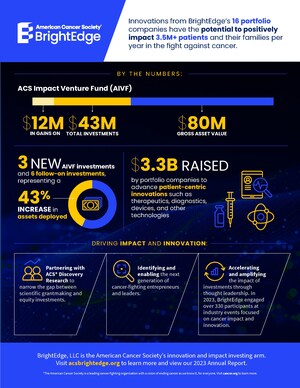ATLANTA, June 11, 2024 /PRNewswire/ -- For all men, particularly Black men, sharing and bringing awareness to their prostate cancer risk and health history may mean celebrating more Father's Days with their loved ones. According to the American Cancer Society, talking to your family members about their medical history is one way to know if you are at higher risk of prostate cancer and if screening may be right for you.
Studies show that prostate cancer seems to run in some families, and in those cases, there may be an inherited or genetic factor that contributes to prostate cancer risk. Having a father or brother with prostate cancer more than doubles a man's risk of developing this disease during their lifetime. The risk is much higher for men with several affected relatives, particularly if those relatives were young when the cancer was found.
In the US, Black men have the highest prostate cancer incidence rate and tend to develop the disease at a younger age than other men. They are over twice as likely to die from prostate cancer and are more likely to be diagnosed at an advanced stage compared to White men. Considering the higher incidence and mortality rates among Black men, increasing screening rates may be the key to catching more prostate cancers early and saving more lives.
"It's clear that Black men are disproportionately affected by prostate cancer and more needs to be done to get the word out to the community about screening and early detection," said Dr. Wayne A. I. Frederick, ACS board member and President of Howard University. "Bringing access and awareness to the Black community about medical treatments and opportunities to join clinical trials may make a big difference in curbing these statistics."
Prostate cancer can often be found early by testing for prostate-specific antigen levels in a man's blood. When prostate cancer is found early, it may be easier to treat, which is why screening tests are so crucial.
It's said that self-reported screening rates with prostate-specific antigen testing among Black men are slightly lower (31%) than in White men (38%). ACS recommends that men at high risk, including Black men, begin talking to their health care providers about screening for prostate cancer at age 45. To find a screening location near you, go to https://getscreened.cancer.org/.
To curb the rise in prostate cancer for all men, especially for Black men, ACS recently launched IMPACT, an initiative geared toward Improving Mortality from Prostate Cancer Together.
"We are sounding the alarm and taking on this crucial challenge to improve outcomes for all men, as well as reverse disparities for Black men through IMPACT," said Dr. Karen E. Knudsen, CEO of the American Cancer Society and ACS Cancer Action Network. "This is a bold move that will save lives by funding new cancer research programs that connect the laboratory, the clinic, and the community."
Understanding the Symptoms and Risk Factors
Aside from screening, knowing the symptoms and risk factors for prostate cancer is another way Black men can prioritize their health. It's important to know that early prostate cancer normally doesn't cause symptoms; however, in some cases men may have symptoms though it is less common. These symptoms include problems urinating, including a slow or weak urinary stream or the need to urinate more often, especially at night, and blood in the urine or semen.
More advanced prostate cancer symptoms include those listed above and can sometimes present as trouble getting an erection, bone pain in the hips, spine, chest, or other areas. Other symptoms include weakness or numbness in the legs or feet, or even loss of bladder or bowel control, from cancer in the spine pressing on the spinal cord, weight loss, and feeling very tired.
While most of these symptoms are more likely to be caused by something other than prostate cancer, it is important to be aware and tell your health care provider if you are experiencing these symptoms.
While not all men are at a higher risk of developing prostate cancer, there are some factors that may play a key role in increasing a person's chance of contracting it. Understanding these factors may be critical when deciding to get screened for prostate cancer.
One of the factors researchers have found to be linked to prostate cancer is older age. The chances of having prostate cancer increases quickly after age 50. It is reported that about 6 in 10 prostate cancers are found in men older than 65.
Race, ethnicity and family history also play a role in a person's likelihood for developing prostate cancer. Prostate cancer occurs more often in Black men and in Caribbean men of African ancestry than in men of other races. Men with a family history are also at an increased risk as described above. Additionally, a family history may indicate an inherited or genetic factor that increases risk. Yet, most prostate cancers occur in men without a family history.
In an effort to spread the word to the Black community about the importance of early detection for prostate cancer, Pfizer has provided funding to ACS in support of the launch of "Change the Odds: Uniting to Improve Cancer Outcomes™," a new initiative to start creating change where it is most urgently needed: in communities disproportionately impacted by breast and prostate cancer. The initiative will raise awareness of no- and low-cost screening, enhance access to support and navigation services and provide general information about clinical trial opportunities, including culturally and linguistically diverse resources.
About the American Cancer Society
The American Cancer Society is a leading cancer-fighting organization with a vision to end cancer as we know it, for everyone. For more than 110 years, we have been improving the lives of people with cancer and their families as the only organization combating cancer through advocacy, research, and patient support. We are committed to ensuring everyone has an opportunity to prevent, detect, treat, and survive cancer. To learn more, visit cancer.org or call our 24/7 helpline at 1-800-227-2345. Connect with us on Facebook, X, and Instagram.
SOURCE American Cancer Society

WANT YOUR COMPANY'S NEWS FEATURED ON PRNEWSWIRE.COM?
Newsrooms &
Influencers
Digital Media
Outlets
Journalists
Opted In






Share this article